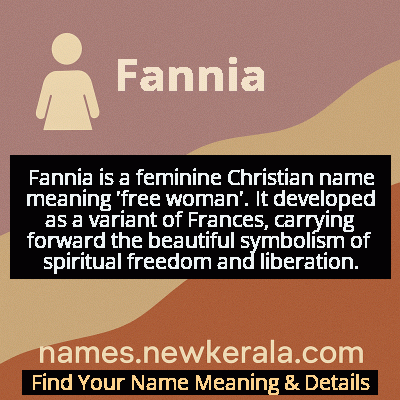Fannia Name Meaning & Details
Origin, Popularity, Numerology Analysis & Name Meaning of Fannia
Discover the origin, meaning, and cultural significance of the name FANNIA. Delve into its historical roots and explore the lasting impact it has had on communities and traditions.
Name
Fannia
Gender
Female
Origin
Christian
Lucky Number
9
Meaning of the Name - Fannia
Fannia is a feminine Christian name meaning 'free woman'. It developed as a variant of Frances, carrying forward the beautiful symbolism of spiritual freedom and liberation.
Fannia - Complete Numerology Analysis
Your Numerology Number
Based on Pythagorean Numerology System
Ruling Planet
Mars
Positive Nature
Generous, passionate, energetic, and humanitarian.
Negative Traits
Impulsive, impatient, moody, and can be overly emotional.
Lucky Colours
Red, maroon, scarlet.
Lucky Days
Tuesday.
Lucky Stones
Red coral, garnet.
Harmony Numbers
1, 2, 3, 6.
Best Suited Professions
Military, sports, philanthropy, leadership roles.
What People Like About You
Courage, energy, leadership, generosity.
Famous People Named Fannia
Fannia
Ancient Roman Noblewoman
Member of the distinguished gens Fannia, known for her political influence and support of Stoic philosophers
Fannia Cepionis
Roman Matron
Remembered for courage in preserving her husband's writings after his execution and defending his legacy
Saint Fannia
Early Christian Martyr
Venerated in Christian traditions as a martyr during the Diocletian persecutions
Name Variations & International Equivalents
Click on blue names to explore their detailed meanings. Gray names with will be available soon.
Cultural & Historical Significance
In Christian contexts, Fannia evolved as a feminine variant of names derived from Franciscus, meaning 'free'. This connected it to concepts of spiritual freedom and liberation central to Christian theology. The name appears in martyrologies and saint traditions, though records are often conflated with similar names. This dual heritage—Roman nobility and Christian virtue—made Fannia appealing to families wanting to honor both classical education and religious faith, particularly during the Renaissance and Victorian eras when classical names saw revivals.
Extended Personality Analysis
Women named Fannia are typically associated with a unique blend of strength and grace, reflecting their name's dual heritage of Roman nobility and Christian virtue. They often possess a quiet confidence and natural dignity that draws respect without demanding it. Their independent nature is balanced by deep loyalty to family and principles, creating individuals who are both self-reliant and deeply connected to their communities. The historical Fannias were known for their political acumen and intellectual interests, suggesting that modern bearers might inherit tendencies toward thoughtful analysis and cultural appreciation.
This name suggests a personality that values freedom but understands it as responsibility rather than license. Fannias are often perceived as having strong moral compasses and the courage to defend their beliefs, much like the early Christian martyrs who bore similar names. They tend to be resilient in adversity yet maintain their elegance and composure. Their strength is typically understated—more like the enduring marble of Roman architecture than dramatic fireworks. This creates individuals who provide stable leadership and wise counsel, often becoming the quiet backbone of their families and social circles.
Modern Usage & Popularity
In contemporary usage, Fannia remains an uncommon but meaningful choice, primarily selected by parents seeking a name with historical depth and Christian significance. Its usage is most frequent among families with Italian heritage or strong Catholic traditions, where classical names and saint associations are valued. The name has never ranked in popular name charts, maintaining its status as a distinctive option rather than a trendy one. Recent years have seen slight increases in usage as part of the vintage name revival movement, though it remains well outside the top 1000 names in English-speaking countries. Its rarity makes it appealing to parents wanting a unique name that won't be shared by multiple classmates, while its classical roots and spiritual connotations provide substantial meaning and heritage.
Symbolic & Spiritual Meanings
Symbolically, Fannia represents the harmonious integration of freedom and responsibility—the ability to exercise personal autonomy while maintaining commitment to community and tradition. The name evokes the image of the Roman matron who managed complex households with wisdom and the Christian martyr who maintained faith under persecution. It symbolizes dignified strength that doesn't need to announce itself, much like the quiet influence of the historical Fannias who shaped events through intelligence and principle rather than brute force. The name also carries connotations of cultural bridge-building, connecting classical antiquity with Christian modernity, suggesting individuals who honor tradition while moving forward. Like the ancient Roman roads that connected empire, Fannia symbolizes creating pathways—for ideas, for relationships, for progress—while maintaining the structural integrity of one's core values and identity.

